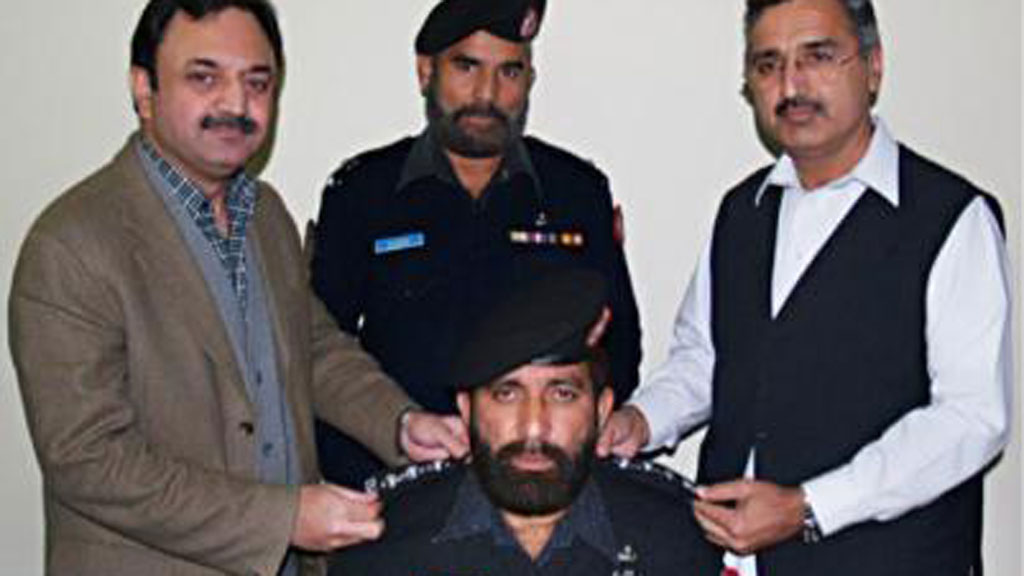Pakistan mourns the loss of bomb unit expert
Hukam Khan was one of the most talented bomb disposal experts in the volatile Khyber Pakhtunkhwa region of Pakistan, defusing scores of bombs and IEDs around Peshawar.

On a day when Britain bowed its head on National Police Memorial Day, and as America marked the death of the 2,000th US solider killed in Afghanistan, Pakistan too remembered colleagues who have died in conflict.
Belonging to Matani village in Peshawar district, Hukam Khan joined the police force as constable in 1978.
The Inspector was regarded an asset to the bomb disposal unit. He had vast experience defusing improvised explosive devices – IEDs often planted by militants and al-Qaeda operatives to target Pakistani troops and government supporters.
On Friday, his unit was called to defuse a device near Frontier Road on the boundary between Peshawar and Khyber tribal region, where Pakistani troops fight militants.
Remote-control trigger
There are conflicting reports surrounding the circumstances of his death. Some say the Inspector manually defused the explosive and had neutralised one of the IEDs when militants used a remote-control device to trigger another IED planted nearby. Other reports say there was no time to diffuse the device or even clear the area before the explosion. In any case, he died instantly.
Governor Masood Kausar, Chief Minister Ameer Haider Hoti and senior civil, police and army officials attended the funeral prayer for Hukam Khan, paying tribute to the explosives expert.
But while the police inspector may be put to rest, questions linger about whether his life could have been saved. Only months ago, the Bomb Disposal Unit(BDU) was reportedly provided with four robots to detect and defuse explosives without endangering human lives.
Some colleagues wonder why those robots were not operating properly – or at all – when Hukam Khan was killed.
Deadly debate
On the day of his death, Hukam Khan’s unit received a tip-off about a bomb planted in the jurisdiction of the Badaber Police Station in Peshawar, a senior police official said.
Even after the death of the Inspector, the bomb disposal experts carried on, sweeping the area and defusing four other devices.
Police also launched search operation in the area, the police official said. In some accounts, the militants ran away. In others, police claim to have gunned down one suspect, injured another and were holding 10 others for interrogation in relation to the IEDs. In at least one account, the militant was described as a commander of the outlawed militant group Lashkar-e-Islam.
Assistant Inspector General Shafquat Malik, in charge of bomb unit in Khyber Pakhtunkhwa, said the robots had been made functional for Peshawar but could not be moved to remote areas.
“That is the reason that even after the death of Hukam Khan our men defused four other IEDs manually,” the Assistant Inspector General said.
Safety kit missing
Some believe there were other problems, however. They claim Hukam Khan was not wearing his safety kit when he died – kit some feel should be made compulsory by BDU management for every expert handling explosive material. The robots are another source of friction.
“If the robots cannot be used in rural areas then the machines are of no use as over 70 per cent of IEDs are planted in these parts of Peshawar district,” one police official said, asking that his name not be used.
Most of the explosives throughout the province are also planted in remote areas, the official added.
Intensive training
Syed Akhtar Ali Shah, Inspector General of the Special Branch of Police, said last week that BDU staff would undergo an intensive training for operating the robots so that these could be utilised properly.
“These are to be used according to the situation. The assistant inspector general BDU as an expert decides about its use,” he said.
That training may be enough to save lives going forward. But Inspector Hukam Khan;s colleagues will have to find comfort only in that he died in the line of duty, a valued member of a force he served for more than 30 years.